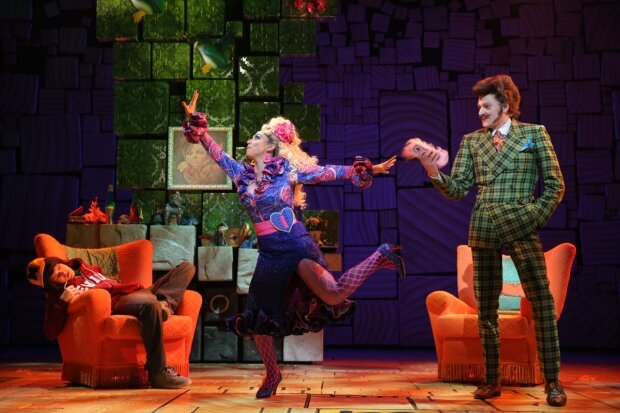Cruel Intentions, with Apologies to Matilda
Photo by Joan Marcus
Originally published on NewYork.com
View this story online
In Matilda The Musical, Gabriel Ebert and Lesli Margherita play Mr. and Mrs. Wormwood, the neglectful, TV-obsessed parents of everyone’s favorite child-genius heroine. With great zeal, the two berate their onstage daughter and ignore her for the television each night. In one scene Mr. Wormwood, angered by Matilda’s ability to find entertainment and satisfaction in a library book, snatches it from her and rips it up.
In the nasty Wormwood characters, Ebert and Margherita have found roles that drastically differ from their personal and professional backgrounds. Both actors grew up in supportive households with little to no television or internet. And of course, they both loved to read.“I had great parents, great teachers,” said Margherita, who plays Matilda’s mother, of her own book-filled childhood.
“When I was a kid, there was no internet. Reading was everything. How funny that now we’re ripping the books up.”After premiering in London to rave reviews (and a record seven Olivier Awards), Matilda, now in previews at the Shubert Theatre on Broadway, will open April 11 as one of the season’s most anticipated productions, with Tony whispers already swirling.
Adapted from Roald Dahl’s beloved novel, Matilda tells the story of a little girl with a brilliant mind whose precocious talent for reading and a desire to learn change her life. Despite her aptitude, she’s ignored by her parents and sent to a school with an abusive headmistress. Spunky and determined, Matilda puts her brainpower to work helping her fellow students and her caring teacher Miss Honey.
Being evil on a nightly basis to the four young actresses who share the role of Matilda can be difficult, said Margherita, who received an Olivier Award in 2009 for her work in the West End production of Zorro, but it helps that the children in the audience appear to be completely unfazed.
“They’re so smart,” she said. “We’re so cartoonishly bad that they get it. I don’t think they’re frightened of us. The Wormwoods are both just so dumb, people forgive a lot.”
I think the audience gets to love us in their way, but actually our being cruel and daft is essential to Matilda being the hero,” Ebert added, explaining that despite the occasional gasps of disapproval from the crowd, the parents’ treatment of Matilda allows audience members to relate to the heroine more deeply.
Finding a way to be cruel and daft was a challenge for Ebert, who is known for roles on and Off-Broadway that have involved a great deal of intelligence and awareness , most notably as an understudy in the play Red and as a young man biking cross-country in 4000 Miles. But after a few weeks of rehearsal, Ebert said he came to terms with the character.
“It’s actually pretty fun now,” he said.“They just are who they are, and there’s no apologies,” Margherita added. “There’s something really great about that.”
Because their characters are so neglectful of their daughter, Margherita and Ebert were careful to not become too close with the actresses playing Matilda throughout the rehearsal process.
“They did not want us to connect much,” Margherita said. “We obviously connect out of character, but in character they did not want us to have much to do with her. It’s almost like she doesn’t exist in our family. I think we were worried that [actresses playing Matilda] wouldn’t differentiate. But I think they love it. They love it when we scream at them.”
Making an effort not to connect with the child performers offstage was foreign to Ebert, who said that feeling tied to the ensemble has always been part of his relationship to the theater and how he contributes to a play.
“It’s funny because the Wormwoods are sort of their own little island in the midst of this huge musical,” said Ebert. “As the piece has come together, we’ve actually created cool bonds with the girls backstage, but the rehearsal process was one that we both had to adjust to. In the end, I think that it was really helpful for us, getting to the place we needed to be to play the characters.”
“I think if we’d gotten too close to the girls, I wouldn’t want to be so mean,” said Margherita. “It would be hard because those little faces just look up at you onstage like, ‘Oh! Heartbreak!”
’When Matilda begins to take charge of her life and ultimately puts her special gifts to use exacting revenge on her awful parents, Margherita and Ebert don’t take it personally.
“It’s the underdog. It’s the little voice that can make such a huge difference,” Margherita said of Matilda’s story. “And it’s like starting your own little revolution. This little girl is so amazing. I think it’s such a great message for kids.”
“The fact that it’s children who want to read or get away from cruelty or stop being oppressed,” Ebert agreed, “I think it’s actually a really positive message. It’s cheeky enough that adults get joy from it, and it’s truthful enough that everyone can feel attached to it.”
Matilda’s cast includes 16 children, and both Margherita and Ebert say that working with the ensemble of kids, who all display professional attitudes and boundless enthusiasm, is inspiring.
“For some of them, this is their fourth Broadway show. They’ve got more credits than we do,” Ebert said. “They’re serious professionals. And the talent is just ridiculous. It brings some incredible joy to it, too, which is infectious.”
“Before this job, I was so afraid of child actors,” Margherita said. “But these kids aren’t typical child actors. They’re just kids having a blast. They’re so smart. We peek through the curtains during [the song] ‘Revolting Children,’ and I am crying, because they are so great and so amazing and so dear. Everyone single one of them. It’s phenomenal.”

